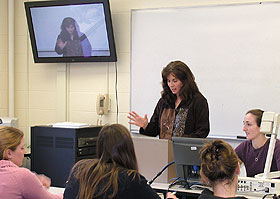  |
| HOME | THIS ISSUE | CALENDAR | GRANTS | BACK ISSUES | < BACK | NEXT > |
Family studies professor helps students understand agingby Sherry Fisher - February 23, 2009
|
||||
| Laura Donorfio describes her teaching philosophy as practical pedagogy. “It’s not just the content area that I try to get across,” says Donorfio, an assistant professor of human development and family studies in the College of Liberal Arts and Sciences. “I want students to understand what they can do with that content and theory once they graduate and go out into the real world. I teach them how the course material is relevant to their everyday lives, their families, and their communities, and how they can use it in their careers.” Donorfio teaches courses on adulthood and aging, aging and society, death and dying, human sexuality, and public policy and the family. She was recently recognized for teaching excellence when the Association for Gerontology in Higher Education awarded her the Distinguished Teacher Honor. The award will be presented this month at the Association’s annual meeting. Donorfio earned her doctorate in family studies at UConn in 1996, and worked for several years in the corporate world before joining the University faculty. She says aging isn’t a subject most people are eager to study: “People don’t want to age. Death and dying isn’t a topic people want to talk about. I have to take these topics to another level.” Keeping students engaged is the key to their learning, Donorfio says: “The more involved students are with the material, the greater the level of success.” That’s why her courses integrate field trips, speakers, videos, and documentaries. “Over the years I’ve collected a lot of cutting-edge videos on a variety of topics,” she says. “I like to mix things up, rather than give traditional lectures.” Her course on death and dying has included a trip to a funeral home. A class on aging was marked by a visit from a 100-year-old woman. Lawyers and state representative speak in her public policy and the family course, and she gives extra credit if students vote.
“I like to show them how policy really dictates our family and social structure, and how we can have an impact on policy,” she says. “They need to know that one person can make a difference.” Donorfio encourages student input as early as the first day of class. She has them review the syllabus and asks for their suggestions: “If there’s a topic they’d like to learn about that’s not there, I ask them to let me know.” Every day she brings a book to class for discussion. She does the same with articles and current news pieces. “By the third week, students are bringing in books for me to read, or newspaper articles – without my even asking,” she says. “Sometimes I’ll get an e-mail with a link, and the student will say, ‘I think you’ll like this.’ That’s exciting.” One of Donorfio’s most important teaching accomplishments has been to develop an interactive television – iTV – program to enable students at the Tri-Campus to take more human development and family studies courses. Donorfio’s courses are always oversubscribed. Students praise her teaching and note her passion for the elderly. “She’s a wonderful teacher,” says former student Autumn Stokes, who took Donorfio’s course on death, dying, and bereavement. “Due to past pain with the loss of my grandmother, I was hesitant to take the class. She presented an emotional topic in a soothing and comforting manner.” Marion Buonocore, another former student, says, “You can feel her excitement and get caught up in the energy. She has not only given me the educational background I needed, but also intensified my desire to work and care for older adults.” |
| ADVANCE HOME UCONN HOME |

